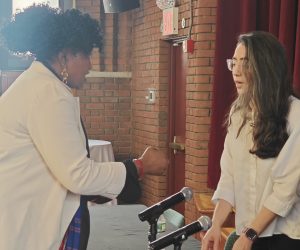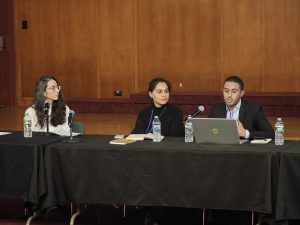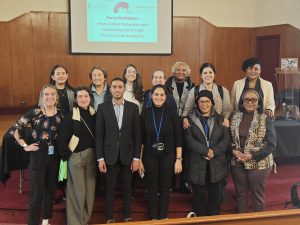On March 18th, IANGEL and Heinrich Böll Stiftung presented “Force Multiplier: How Global Networks and Intersectionality Fight Poverty and Inequality”, a parallel event in connection with the United Nations 68th meeting of Commission on the Status of Women (CSW68). The discussion focused on how civil society organizations and intersectional analytical tools can address the root causes of the poverty gender gap.
 Natalia Urzola, IANGEL Board member and an environmental lawyer from Colombia, opened the event with short introductions of each of our panelists: Nancy J. Newman, partner at Hanson Bridgett LLP and Founder and CEO of IANGEL, Mahassen Segni, activist and Senior Program Coordinator for the Democracy Program and Gender/PSEAH Focal Point at the Heinrich Böll Foundation Tunisia office, Dr. Ramy Khouili is a medical doctor and Country Director at Avocats Sans Frontières (ASF) in Tunisia, and Stella Odife, a barrister and co-founder of the Women’s Organisation for Gender Issues (“WOGI”) in Lagos.
Natalia Urzola, IANGEL Board member and an environmental lawyer from Colombia, opened the event with short introductions of each of our panelists: Nancy J. Newman, partner at Hanson Bridgett LLP and Founder and CEO of IANGEL, Mahassen Segni, activist and Senior Program Coordinator for the Democracy Program and Gender/PSEAH Focal Point at the Heinrich Böll Foundation Tunisia office, Dr. Ramy Khouili is a medical doctor and Country Director at Avocats Sans Frontières (ASF) in Tunisia, and Stella Odife, a barrister and co-founder of the Women’s Organisation for Gender Issues (“WOGI”) in Lagos.
The opening question asked about “force multipliers,” and how IANGEL’s work contributes to fighting gender inequality and poverty. Nancy shared that IANGEL is a “force multiplier” through its global network of gender justice advocates and she believes that global networks are powerful and instrumental in fighting inequality and building movements for change. She believes that there is power in uniting and working together, to which all of the panelists agreed.
“I have seen the power of people working together to make a real difference in people’s lives. I have felt the joy of the realization that power can provide. It sustains me…it is a life force.”
The discussion then turned to each of the panelists, where Natalia took turns asking how each of their work contributes to addressing the poverty gender gap, tackling gender inequality, and what tools are needed to help the most vulnerable of communities. Mahassen shared that in order to tackle the gender poverty gap, there needs to be an intersectional approach applied, Dr. Khouilli provided tips for supporting LGBTQIA+ communities, and Stella shared her experience working with women in Nigeria as head of WOGI.
“We need power to fight discrimination, to promote equality and to build a movement for change.”
The panel discussion ended with a question and answer session where our very engaged and motivated audience asked questions from each of the panelists about how their work can be a “force multiplier” to fighting gender inequality. Special thanks to Natalia Urzola for organizing this engaging parallel event and to Heinrich Böll Stiftung for partnering with us.
Share this post:




